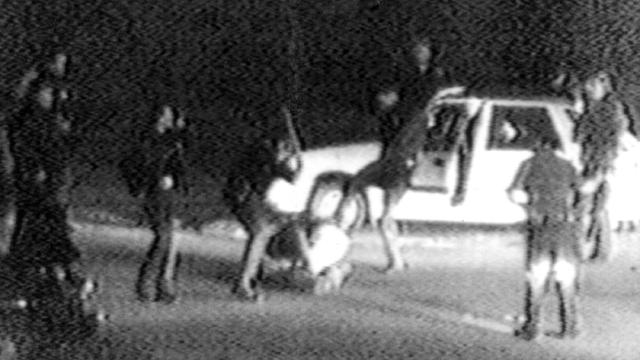
Image from the Rodney King beating on March 3, 1991
When we last visited the topic of hip hop’s relationship with the police, we toured the Watt’s Riots (the event that ultimately caused the birth of hip hop) and the formation of NWA. The relationship, however, does not end there. The title says ‘complicated’ for a reason. In this week’s extension, we will explore the 1992 L.A riots and the music stemming from the uprising.
1992: L.A Riots
Following the acquittal of the four officers involved in the beating of Rodney King, a series of riots and civil disturbances began in Los Angeles. The rioting took place over the span of six days and left 63 people dead, 2383 injured and more than 12,000 arrested.
This situation was so impactful that L.A gangs who were often at war settled their differences via peace treaty. A ten-page proposal was crafted detailing ways that the warring gangs could help better their communities during those trying times. Even members of the Bloods and the Crips were found speaking on live television together denouncing violence in their communities. It’s quite safe to say that this case left a mark on many people during the time.
Hip Hop Responds to L.A Riots
Some rappers were marching alongside the protestors during the riots, some were busy making songs about the riots and some were even upset at Rodney King for calling for peace and siding with the opposition. Some rappers, however, took it a step further and released controversial tracks expressing their thoughts.
Ice Cube: We Had To Tear This Mother****a Up
Ice Cube has news reports from the Rodney King trial sampled throughout this track. In the lyrics, Ice Cube warns Judge John Davies, the judge in Rodney King’s trial, that the hood will retaliate as a reaction to the unjust ruling for the officers involved.
In the track, Ice Cube also throws shots at the officers involved in the beating. In the second verse, he says “I got a mac-10 for Officer Wind… Now he ain’t nothing but food for the maggots.”
The track goes on with numerous threats of violence towards people involved and foreshadowing of what would eventually come to be known as the L.A Riots.
This song was not the first one to release pertaining to the L.A Riots, but it was a part of a trend that had already been brewing in hip hop: hatred toward the police.
Other songs with similar subject matter include:
Willie D, “F*** Rodney King
Dr. Dre, “The Day The N***az Took Over”
Public Enemy, “Hazy Shade of Criminal”
Cypress Hill, “Stoned Is The Way To Walk”
The aftermath of the Rodney King incident left a horrid taste in the mouths of many blacks at the time. The video, the court case, the ruling and the general corruptness surrounding the case and the police at the time led to a general distrust of the police by many blacks, including rappers.
Interested in how this all ties in to today’s climate? Tune in next week for pt. 3 in this series detailing the themes that are still carried over into current day pop culture!
–Sojourner Freeman